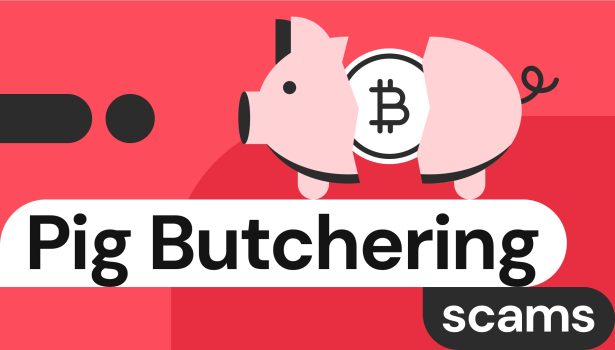What is a pig butchering scam and how to avoid it

A pig butchering or pig fattening scam is a type of investment scam where perpetrators build a seemingly close relationship with the victim—romantic, friendly, or business-focused—to draw them into a fraudulent investment scheme in order to steal their money. This can happen in any currency, but crypto is scammers’ favorite since transactions can’t be reversed and their identities cannot be easily identified.
Trust is an essential element of pig butchering scams, so it’s important to recognize their early warning signs. Read this guide to the meaning, common scenarios, and risks of pig butchering, and learn how to avoid being targeted and losing money.
What is a pig butchering scam?
A pig butchering scam is a long-con financial scam that’s all about building trust with someone over time in order to steal their money. It can combine elements of romance scams, investment fraud, and social engineering to make the victim trust the scammer just enough to fall for whatever they offer.
The term “pig butchering scam” likens the process to fattening the pig before the slaughter, which reflects the long-standing and ominous character of the scam. Some of these scams can evolve over the course of months or even years, with victims investing hefty sums in what they believe to be legitimate investment schemes. In a case cited in our guide to Facebook scams, the scammers have been in contact with the victim for over four years, with the financial loss totalling $271,000.
How the pig butchering scam works step by step
Here’s how a typical pig butchering scheme unfolds.
Initial contact
The scam typically starts with the scammer reaching out to the target via social media, a dating app, or a messenger under a plausible excuse (such as having a romantic interest or contacting the “wrong number” by mistake). The communication then turns into regular casual chatting.
Messengers are scammers’ go-to tools as they support encrypted chats for added privacy and offer nearly limitless opportunities to find and reach out to new contacts. With minimal to zero identity verification, messengers are instrumental for impersonators and other bad actors running scams on Telegram, Signal scams, or WhatsApp scams.
Building rapport
After the victim responds positively to the initial contact, the scammers start earning trust through ongoing communication, shared interests, and empathy. Their range of emotional manipulation is broad, especially in pig butchering romance scams. Love bombing, mirroring, idealization, creating a sense of destiny, oversharing, playing on insecurities, or faking a mutual future are all but a few techniques used to make the victim feel heard, understood, validated, or emotionally dependent.
Investment hook
After establishing sufficient trust, the scammer moves on to proposing their investment scheme—the key reason behind the connection in the first place.
The scammer may pose as an active member of a closed investment community, a trading coach, or a business mentor who has been “profiting” from the same scheme and now shares it with the victim out of good intentions. They will often act as a personal guide to the scheme, boasting screenshots with incredible returns and helping the victim set up their trading account.
Under the hood, the trading platform shown is typically a spoofed version of a credible crypto or forex trading website, designed to look like a trusted source, complete with testimonials, success stories, and press clippings. Meanwhile, the crypto wallet addresses or accounts used in transactions belong to the scammer, so the money goes right into their pocket.
First “profits” and escalation
An essential part of proving the credibility of the scheme is staging the victim’s first trading successes. Early investments will seem to yield profits, so the victim is encouraged to invest more. The scammer may even allow the victim withdraw a small amount of money to prove the scheme is trustworthy.
The platform may display the victim’s increased balance, but it’s likely to be a fake dashboard. In reality, these numbers are manipulated by fraudulent website admins to make the victim believe they’re turning a profit and keep it going.
Cashout, or the “slaughter”
After investing a large sum of money, the victim eventually fails to make a withdrawal. They may be locked out of their account, told to pay “fees” or “taxes” to proceed with the withdraw, or the platform may simply disappear along with the scammer and their chat history.
Real-life examples of pig butchering scams
According to the FBI’s Internet Crime Complaint Center (IC3), investment scams were the fifth-largest category by complaint count in 2024. Yet, with 47,919 scams reported, the total loss from fraudulent investments amounted to $6.57 billion, making it the top one category by complaint loss, with $137,120 lost on average per complaint. Across all complaint types, those involving cryptocurrencies totaled $9.32 billion in overall losses.
These grim numbers are supported by numerous reported cases that show just how much financial damage pig butchering scams can cause:
- In 2022, four men were arrested in Australia over a pig butchering scheme that defrauded crypto investors globally of more than US$100 million.
- California residents lost thousands of dollars investing in the fraudulent crypto exchange AELs-Exchange.com, promoted in a WhatsApp trading group advertised on Instagram.
- In 2022-2023, scammers operating from the Isle of Man conned victims in China, engaging them via the QQ messenger and hyping up a crypto investment scheme, with at least 12 victims collectively losing more than $5 million.
- In this far-reaching pig butchering romance scam operated from Hong Kong, AI deepfake technology was used to deceive victims over video calls and steal $46 million through fraudulent cryptocurrency investments.
Warning signs of a pig butchering scam
Sometimes pig butchering starts just like any other casual online relationship, but there are telltale signs that point to the underlying scam:
Out-of-the-blue contact
The conversation is typically unsolicited, started by a stranger on social media, a dating app, or a messenger app, where it quickly becomes personal and engaging.
Fast emotional attachment
The scammer will make you feel like there’s a special connection between you, using constant affection and flattery to escalate the relationship.
Unusual availability
They are always available, even at odd hours, ready to respond, support, and provide feedback whenever you need it.
Casual investment talk
Sooner or later, the conversation gradually shifts to topics like investment, trading, and crypto—with a convenient story about how they earned incredibly high returns and now want to show you how to profit too.
Too-good-to-be-true returns
The advertised scheme is likely to promise unusually high returns to make it all the more enticing for you to try. Recognizing potential hesitation, the scammer may suggest you invest a small amount first or even offer to “match” your investment with the same amount from their side.
Secrecy
They may ask you not to share the scheme with anyone and to keep your relationship and investment plans secret from your friends and family.
Strange behavior
They may share only sketchy details about their life, avoid meeting in person or via video calls, and use odd grammar. Their profile photo may appear AI-generated or be stolen from a real person.
No way to withdraw what you invested or “earned”
After the initial test withdrawal, you might have difficulty getting any more money back. The platform may stop working, or you may be told that “taxes” or “fees” must be paid to unlock the withdrawal option.
What to do if you think you’re being scammed
If you notice any of the signs above, stop communicating and do not send any more money, especially if you’ve already invested.
Whether or not you’ve sent money to the scammer, report the scam to the relevant authorities:
- U.S. citizens can file a complaint with the FBI’s Internet Crime Complaint Center, even if there is no financial loss. The FBI provides guidance for cryptocurrency scam victims, detailing the information needed to assist with the investigation.
- Residents of California, in particular, can submit a complaint with the Department of Financial Protection and Innovation.
- If you’re based in the European Union, submit your scam report to Europol.
- If any legitimate crypto, stock, or forex exchange was involved, report the scam to their respective customer support and seek assistance.
When reporting a pig butchering scam, include the following details:
- Currency types, amounts and wallet addresses or bank accounts used in the scam.
- Transaction dates and time.
- Cryptocurrency transaction hashes.
- Details about how you met the scammer, where you communicated, websites, and phone numbers involved in the scheme.
Importantly, don’t use any services that promise to recover your lost funds, especially if they ask for an advance fee, as these can be scams, too.
How to protect yourself from pig butchering scams
- Remember that no legitimate trading advisor or investor approaches strangers on messengers like WhatsApp or in dating apps.
- Don’t share any personal and financial information with strangers, even if they appear likeable and trustworthy. It’s easy to stay anonymous and impersonate just about anyone on the internet, so you can never really know who’s hiding behind an avatar.
- Never follow investment advice from strangers, especially if you’ve only met them online.
- Always validate the suggested investment scheme independently through different channels. Look for consistency, endorsements by credible industry organizations, transparent leadership, and appropriate licenses.
- In the U.S., legitimate investment firms are highly regulated. You can check a company’s legal status through Investment Adviser Public Disclosure by SEC (Securities and Exchange Commission), BrokerCheck by FINRA, or CFTC (Commodity Futures Trading Commission).
- Watch out for unrealistic promises, such as “no risk,” “100% safe,” or “200%+ returns.”
Get-rich-quick is a common scam trap luring victims with fake guarantees. - Check the website URLs and apps you’re asked to install for legitimacy and correct spelling, as they may lead to fake versions of real trading platforms.
How Onerep can help you stay safe
Exposed personal data is a hidden entry point for pig butchering scammers. They don’t usually contact random people but gather social intel and select targets based on data cues from:
- Data breaches
- People-search websites
- Public data brokers
- Social media profiles
- Phishing campaigns
- Dark web dumps
Protect your online identity from scammers by limiting your digital footprint. Onerep can do this for you automatically, removing personally identifiable information from 200+ data broker and people-search websites around the internet, so your personal and contact details can’t be easily googled or found.
FAQs
What is pig butchering in crypto?
In a pig butchering crypto scam, the scammer builds a trust-based relationship with the victim over time to introduce them to an investment scheme that eventually turns out to be fraudulent, with the scammer stealing the victim’s invested funds.
Is pig butchering the same as a romance scam?
It’s not the same, although romance scams or dating scams can be part of pig butchering schemes. The romance element is used to build a closer relationship with the victim so they lower their guard and become an easier target.
Why is it called pig butchering?
Pig butchering refers to the process of fattening a pig before slaughtering it, which is a metaphor describing how scammers build long-term fake relationships before stealing money from their victims.
What to do if I sent money to a scammer?
Stop communicating and sending more money. Collect evidence of the scam and report it to the relevant authorities, such as the FBI’s IC3.
Can pig butchering scams be reported to the police?
Yes, pig butchering scams can and should be reported to your local law enforcement. In the U.S., investment scams including pig butchering can also be reported to the FBI’s Internet Crime Complaint Center. In the EU, they can be reported to Europol.





Dimitri is a tech entrepreneur and founder of Onerep, the first fully automated data removal service. Top cybersecurity CEO of 2021 by The Software Report.